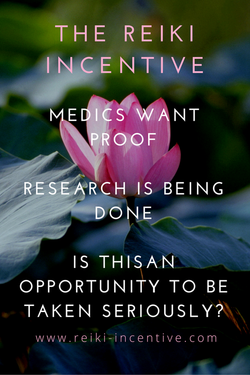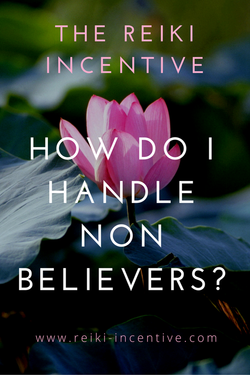
Following my last blog post, this was one of the main questions people had about Reiki and research, so I'll do my best to answer.... From a modern perspective, we can look back and see that the discipline of medicine has a chequered history, where ancient medical theories led to the widespread practice of remedies such as leaching and blood letting. These and other practices did no good whatsoever and were inherently dangerous. If a patient survived this kind of treatment it was in spite of rather than because of it, although neither doctors nor patients had any way of knowing this. So the medical profession generally require evidence of both the safety and effectiveness of treatments so we can be confident that they have a chance of working and to ensure patient safety – do no harm. It was from the period of the enlightenment onwards that medical practitioners began to question the old theories. Since then they have worked to move their profession towards a method of working which involves the questioning of their practice, the comparison of treatments against placebo or against other treatments to test if they work and which ones work the safest and best. In the mid 20th century the movement of evidence based medicine really took hold. This has been defined as “the process of systematically reviewing, appraising and using clinical research findings to aid the delivery of optimum clinical care to patient¹.” This has been really important for medicine and for society. Many medical treatments have the potential to do very serious harm indeed. Surgical intervention and drug treatments can have very serious consequences and side effects. They can and should only be administered if medics have as much certainty as possible that they have a good chance of being effective and that any side effects or risks are minimised and outweighed by the possible benefit of the treatment. Similarly with less invasive treatments, it is important to know that time, money and expectation is not being wasted on treatments which are not of any real benefit. With this approach we have moved as a society to a place where many diseases have been eradicated and many more can be treated. This does not mean however that medicine has all the answers. There is still much to learn, particularly about how to help people manage and live with chronic illness. It is a personal view of mine that this is where disciplines such as Reiki may have a very real place. Evidence based medicine allows for the possibility that new or different approaches, tested by research can and should be integrated into conventional medical care. Research and clinical trials into the benefit of Reiki are beginning to be done. I will post about this next week. It is against the background outlined above that most medics and others in hospitals consider all forms of treatment. Working in a scientific discipline they might look at Reiki and need to know why they should consider introducing it. In the same way that they would look at any other new form of treatment, they want to know what research has been done to demonstrate its value. I will post next time about what sort of research into the benefits of Reiki has been done so far and what this research is beginning to show. Having an understanding of what research has and has not been done, or where Reiki has been shown to be effective or ineffective can help us to promote ourselves ethically, realistically and potentially help many more people with Reiki in places where it would not otherwise go. It is a fine line to tread. Reiki as we know is experiential not scientific. Being holistic and spiritual in nature it is not possible to predict or direct how and in what ways people find it beneficial. This can make it a challenge to research and can impact on how we interpret the results of very specific and tightly controlled trials. But research into the benefits of Reiki can be and is being done. It's an interesting and exciting time for Reiki! I hope that The Reiki Incentive will ultimately help practitioners to learn enough about how to find and evaluate research to be able to discuss these issues with confidence. If you have any comments, suggestions or anything to add please comment in the blog. Reference. 1. Rosenberg W, Donald A. “Evidence based medicine: an approach to clinical problem-solving.” BMJ 1995; 310: 1122–1126.
0 Comments

I simply LOVE this question. Read on and I'll explain.. I recently asked a large group of Reiki practitioners and students what their biggest question, challenge or concern was when thinking about taking their Reiki practice forward. By far one of the biggest areas of concern related to a real fear as a practitioner of not being taken seriously, of not knowing how to respond to other people's perceptions and how to approach people who do not consider Reiki as a valid form of therapy. Typical fears that practitioners had were:
I have SO been there and felt that. Have you? I first heard about Reiki in 1993 in Australia. A close cousin of mine recommended that I should try a treatment if ever I had the chance. I didn't really understand what Reiki was, but that chance finally arrived very much later in 2002 when a friend and newly qualified Reiki practitioner suggested I try a treatment with her. She was sure that it would be helpful for my chronic back and hip pain. To be honest, I was somewhat sceptical and rather unsure about the whole process. But she meant well and I was happy to go along and try this free treatment. I really enjoyed the treatment and was absolutely fascinated by the whole experience. It certainly give me some short term relief, but much more than that – it opened a window for me. Training soon followed, and I set up in practice. And boy, did those fears kick in! My fears weren't helped by the fact that at the same time I was working in our National Health Service. Whilst on the one hand I was extremely privileged to watch as a team of highly specialist professionals incorporated the latest treatments to help people suffering with chronic pain. These new approaches included Acceptance and Commitment Therapy and other Mindfulness based treatments which, like Reiki have their roots in Japanese Buddhism. I was on a fascinating journey of discovery as I continued with my Reiki training, learning more and more about the traditional Japanese practices, treating myself and others with Reiki and learning through experience how supportive and valuable Reiki can be. I began to see overlap between Reiki practice and many of the techniques used by the team. But oh boy! Try to engage in a discussion about this with medics in the UK and you might be in for a fight! You might find one or two who will show a quiet interest, but the rest – they'll either fall of their chair laughing or more commonly get angry or defensive - “It is all nonsense, there is no scientific evidence, it's not scientifically plausible, it's quackery, it's nothing short of a pyramid marketing scam etc. etc” blah de blah de blah… One objection I frequently encountered was that Reiki needed to be evaluated by properly conducted clinical trials which needed to be published in peer reviewed journals. Say what? In some ways it felt like a deliberate put down designed to shut me up and cut me off at the knees. It wasn't, and I'm still great friends with my colleagues from that time. It inspired me to rise to the challenge and to get on top of this whole issue so that I could understand it properly and engage with the arguments on an equal footing. I completed a masters degree in health research and really got inside the whole issue. It's a great and important one. So, back to our original question about our fears of not being taken seriously as Reiki practitioners. Many of us practitioners secretly hold these fears and we'll certainly come across prospective clients who won't view our practice as valid. But... I have been lucky enough to personally discover that ideas from Japanese Buddhism are being used now in mainstream medical practice (even here in the UK!), ideas which share a common heritage with Reiki and which also run through the Reiki principles and teachings. I've also personally unpicked the issue of clinical evidence, looking at what research has been done and how, what it shows and how it can (and should) affect and enhance our practice. More and more academics are looking into Reiki. They are beginning to reveal just where and how Reiki is shown to be helpful, although the research so far consists of small studies, and some have not been well designed - yet. But this is still a very exciting time for Reiki. I feel personally inspired to share this information with those from the Reiki world who, like me, hold the above fears and are interested in overcoming them in a professional way with a view to taking Reiki forward in the world, perhaps to people who would otherwise never have considered or experienced it. Look through the blog, where I share some of the findings of various studies. Most health professionals have access to research guidance as part of their roles. It's time we had the same so that we can move forward professionally, really pitch Reiki effectively and get it out there to those who might otherwise not get the opportunity to benefit from it. Sign up below and I'll keep you informed about new posts and resources. Also, why not look at my Top 5 Strategies for Explaining Reiki. You can download a copy there too, It's free! |
Author
Angela established the Reiki Incentive for Reiki practitioners who want to see Reiki more widely accepted and to see it reach new people. She enjoys sharing her passion for authentic practice as well as research into the benefits of this wonderful therapy. Archives
May 2018
Categories
All
|

 RSS Feed
RSS Feed
